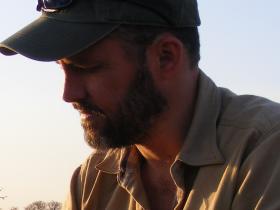Contact details
Role: Deputy Director, Wildlife Conservation Research Unit
Telephone number: 01865 611100

Biography and Research
Andrew Loveridge is a Senior Research Fellow at Lady Margaret Hall and the Deputy Director of the Wildlife Conservation Unit (WILDCRU), Oxford University. Born and raised in Zimbabwe, he read for his doctoral degree in Zoology at Oxford, and after graduating embarked on a career as an ecologist and conservationist. Since 1999 he has run a long-term African lion research and conservation project, initially based in hwange National Park, Zimbabwe, but now covering much of the southern part of the Kavango-Zambezi Transfrontier Conservation Area, under the banner of the Trans-Kalahari Predator Programme (TKPP). Over the last twenty years his research and conservation work on lions and other large carnivores has encompassed lion population management, impacts of trophy hunting, socio-biology, behavior, predator-prey relationships, human-wildlife conflict and its mitigation landscape ecology, and trade. He has published over 100 peer reviewed papers and book chapters. In 2012 he received the SATIB Trust Award for contributions to African Conservation. He is a member of the IUCN Cat Specialist Group, Canid Specialist Group and African Lion Working Group and the KAZA Carnivore Conservation Coalition.
Loveridge is an experienced editor and author, having co-edited Biology and Conservation of Wild Felids (OUP, 2010) and he serves as an Associate Editor for African Journal of Wildlife Research. He recently published an auto-biographical account of his research and conservation work, Lion-hearted (Regan Arts, New York 2018), which was included in the Forbes Ten of the Best Books About Climate Change, Conservation, and The Environment of 2018.
Selected publications
Loveridge, A. J., J. L. Seymour-Smith, R. Kotze, A. Sibanda, and K. Collins. 2020a. Evidence of predation on aquatic vertebrates by serval in the Okavango Delta, Botswana. African Journal of Ecology.
Loveridge, A. J., L. Sousa, P. Coals, H. O'Donnell, J. E. Hunt, P. Lindsey, R. Mandisodza, and D. W. Macdonald. 2020b. Evaluating the spatial intensity and demographic impacts of wire-snare bush-meat poaching on large carnivores. Biological Conservation.
Matshisela, A., N. Elliot, E. Chinoitezvi, N. Monks, and A. J. Loveridge. 2021. Long distance Afrian lion dispersal between two protected areas. African Journal of Ecology.
Perry, L., K. Jacobsen, T. Moorhouse, A. J. Loveridge, and D. W. Macdonald. 2022. More than a feeling: cognitive beliefs and positive – but not negative – affect predict overall attitudes towards predators. Conservation Science and Practice:e584.
Petracca, L., J. L. Frair, G. Bastille-Rousseau, D. W. Macdonald, and A. J. Loveridge. 2021. Harassment-induced changes in lion space use as a conflict mitigation tool. Conservation Science and Practice.
Robson, A., M. Trimble, D. T. Bauer, A. J. Loveridge, P. Thompson, G. Western, and P. A. Lindsey. 2021. Over 80% of Africa’s savannah conservation land is failing or deteriorating according to lions as an indicator species. Conservation Letters e12844.
Sibanda, L., P. Johnson, E. Van der Meer, C. Hughes, B. Dlodlo, L. J. Mathe, J. E. Hunt, R. Parry, D. W. Macdonald, and A. J. Loveridge. 2021. Effectiveness of community-based livestock protection strategies: a case study of human-lion conflict mitigation. Oryx.
Wijers, M., P. Trethowan, B. du Preez, S. Chamaillé-Jammes, A. J. Loveridge, D. W. Macdonald, and A. Markham. 2021. The influence of spatial features and atmospheric conditions on African lion vocal behaviour. Animal Behaviour 174:63-76.